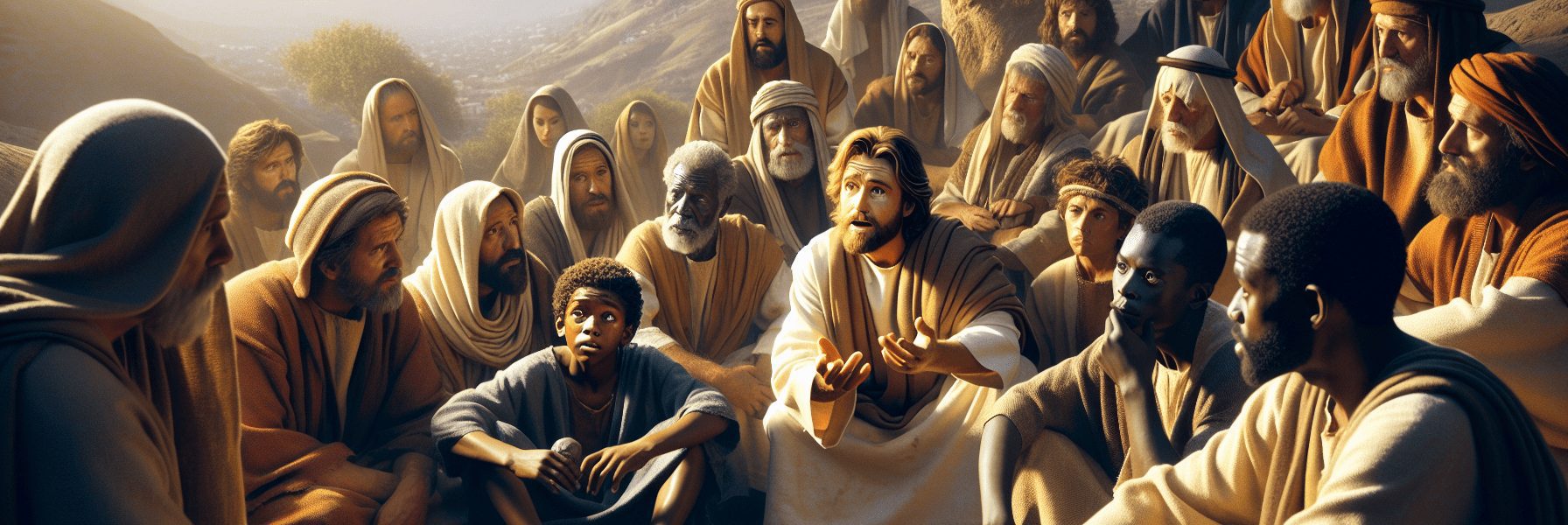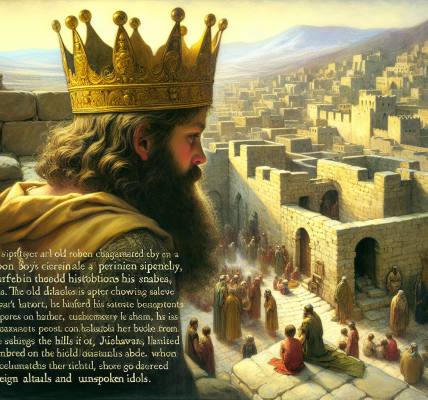**The Parable of the Unforgiving Servant and the Heart of a Child**
The sun hung low over the hills of Capernaum, casting long shadows as Jesus sat with His disciples in the cool shade of a fig tree. The Twelve had gathered close, their faces eager yet troubled, for they had been debating among themselves a question that weighed heavily on their hearts: *Who, then, is the greatest in the kingdom of heaven?*
Jesus, knowing the thoughts that stirred within them, beckoned a small child forward—a boy no older than five, with wide, trusting eyes and hands still sticky from the figs he had been eating. The child hesitated, but Jesus smiled warmly and drew him near, placing him in the center of the circle. The disciples shifted uncomfortably; children were often overlooked, deemed insignificant in the affairs of men.
Then Jesus spoke, His voice gentle yet carrying the weight of divine truth. *”Truly I tell you, unless you change and become like little children, you will never enter the kingdom of heaven.”*
The disciples exchanged glances. To be like a child? Humble, dependent, free from pride—this was the path to greatness?
Jesus continued, His hand resting on the boy’s shoulder. *”Whoever takes the lowly position of this child is the greatest in the kingdom of heaven. And whoever welcomes one such child in my name welcomes me.”*
A solemn silence fell over them. Peter, ever bold, leaned forward. *”Lord, how many times must I forgive my brother when he sins against me? Up to seven times?”*
Jesus’ eyes held a depth of sorrow and wisdom. *”Not seven times, but seventy-seven times.”*
Then, knowing their hearts needed a clearer vision of mercy, He began to tell them a parable.
—
**The Kingdom of Heaven is like a king who wished to settle accounts with his servants.**
The palace stood in splendor, its marble halls echoing with the footsteps of anxious men. The first servant brought before the king owed ten thousand talents—a debt so vast it could never be repaid in a lifetime. The king commanded that the man, his wife, his children, and all he owned be sold to repay the debt.
The servant fell to his knees, his face pressed to the cold stone floor. *”Be patient with me!”* he begged, tears streaming down his face. *”I will pay back everything!”*
The king’s heart was moved with compassion. He did not merely grant an extension—he forgave the debt entirely. *”You are free.”*
The servant left the palace, his heart light, his chains broken. But as he walked through the marketplace, he spotted a fellow servant who owed him a hundred denarii—a mere fraction of what he himself had been forgiven. Seizing the man by the throat, he demanded, *”Pay back what you owe me!”*
The poor man fell to his knees, pleading, *”Be patient with me, and I will pay you back!”* But the servant refused. He had his debtor thrown into prison until the payment could be made.
Other servants, witnessing this cruelty, were deeply grieved. They went to the king and told him everything.
The king summoned the unforgiving servant. His voice, once merciful, now burned with righteous anger. *”You wicked servant! I canceled all that debt of yours because you begged me to. Shouldn’t you have had mercy on your fellow servant just as I had on you?”*
In wrath, the king handed him over to the jailers to be tortured until he repaid his original debt—a sentence that would never end.
—
Jesus fixed His gaze upon the disciples. *”This is how my heavenly Father will treat each of you unless you forgive your brother or sister from your heart.”*
The disciples sat in stunned silence. The weight of the lesson pressed upon them: forgiveness was not a matter of numbers but of the heart. To receive God’s mercy and then withhold it from others was unthinkable.
As the sun dipped below the horizon, Jesus rose, the child still clinging to His hand. The disciples followed, their hearts heavy yet illuminated by a truth as simple as a child’s faith and as profound as the mercy of heaven.
For in the kingdom of God, greatness was found in humility, and forgiveness was the mark of those who truly understood the grace they had been given.




